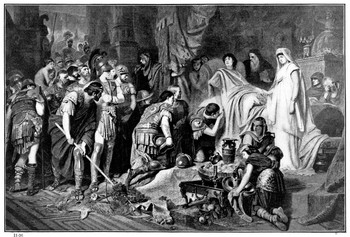|
|

The Life and Successes of Alexander the Great
|
Share This Page
|
|
|
|
|
|
|
Follow This Site

|
 |
|
|
|

|
Part 11: At the Last
The men who did stay behind grew increasingly disappointed in Alexander, who seemed to place more trust in the Persian soldiers and leaders than he did in the men who fought alongside him to conquer the very men that he was having more faith in now. Alexander grew increasingly convinced that he was above it all.
In 324 B.C., Alexander's closest companion, Hephaeston, died. After this, the great warrior king lost the will to live. He had nothing of his old life except the memories. His friends and companions were gone. He was living the life of a foreign ruler in a foreign land. His men were either back home or distrustful of him. He took to drinking large amounts of wine  to drown his sorrows. to drown his sorrows.
In June 323, he became ill. Whether he caught a fever or was poisoned, no one can say with any certainty. What is known is that he died, on June 13.
After his death, his empire crumbled. It was originally split up into several parts, with supposedly strong leaders at the head, in Egypt, in Syria, and in Pergamum. (Click here for map of the empire divided.) But no one but Alexander—with his unique combination of genius, fear, wrath, and determination—could control something so big. Within a few years, the empire was wracked by civil war. But although the fighting continued, the learning, culture exchange, and opening of world views did not. Alexander brought the world closer together in a way not seen before or since.
Read more here: The Legacy of Alexander the Great.
First page > Motives in Motion > Page 1, 2, 3, 4, 5, 6, 7, 8, 9, 10, 11
|
|



 to drown his sorrows.
to drown his sorrows.
